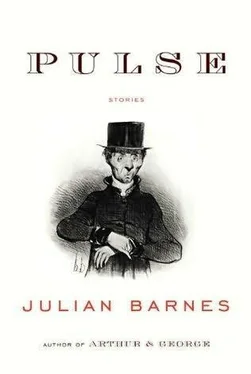He did not expect it would be easy to paint the mare. She would lack the patience, and the vanity, to pose for him, with one hoof proudly advanced. But then, neither would his mare have the vanity to come round and examine the canvas even as he worked on it. The collector of customs was now doing so, leaning over his shoulder, peering and pointing. There was something he did not approve. Wadsworth glanced upwards, from the immobile face to the mobile one. Even though he had a distant memory of speaking and hearing, and had been taught his letters, he had never learnt the facility of reading words upon the tongue. Wadsworth raised the narrowest of his brushes from the waistcoat button’s boss, and transferred his eye to the notebook as the collector dipped his pen. ‘More dignity,’ the man wrote, and then underlined the words.
Wadsworth felt that he had already given Mr Tuttle dignity enough. He had increased his height, reduced his belly, ignored the hairy moles on the fellow’s neck, and generally attempted to represent surliness as diligence, irascibility as moral principle. And now he wanted more of it! This was an un-Christian demand, and it would be an un-Christian act on Wadsworth’s part to accede to it. It would do the man no service in God’s eyes if the limner allowed him to appear puffed up with all the dignity he demanded.
He had painted infants, children, men and women, and even corpses. Three times he had urged his mare to a deathbed where he was asked to perform resuscitation – to represent as living someone he had just met as dead. If he could do that, surely he should be able to render the quickness of his mare as she shook her tail against the flies, or impatiently raised her neck while he prepared the little painting cart, or pricked her ears as he made noises to the forest.
At one time he had tried to make himself understood to his fellow mortals by gesture and by sound. It was true that a few simple actions could be easily imitated: he could show, for example, how a client might wish to stand. But other gestures often resulted in humiliating games of guessing; while the sounds he was able to utter failed to establish either his requirements or his shared nature as a human being, part of the Almighty’s work, if differently made. Women judged the noises he made embarrassing, children found them a source of benign interest, men a proof of imbecility. He had tried to advance in this way, but had not succeeded, and so he had retreated into the muteness they expected, and perhaps preferred. It was at this point that he purchased his calfskin notebook, in which all human statement and opinion recurred. ‘ Do you think, Sir, there will be painting in Heaven? ’ ‘ Do you think, Sir, there will be hearing in Heaven? ’
But his understanding of men, such as it had developed, came less from what they wrote down, more from his mute observation. Men – and women too – imagined that they could alter their voice and meaning without it showing in their face. In this they were much deceived. His own face, as he observed the human carnival, was as inexpressive as his tongue; but his eye told him more than they could guess. Formerly, he had carried, inside his notebook, a set of handwritten cards, bearing useful responses, necessary suggestions, and civil corrections to what was being proposed. He even had one special card, for when he was being condescended to by his interlocutor beyond what he found proper. It read: ‘Sir, the understanding does not cease to function when the portals of the mind are blocked.’ This was sometimes accepted as a just rebuke, sometimes held to be an impertinence from a mere artisan who slept in the stable. Wadsworth had abandoned its use, not because of either such response, but because it admitted too much knowledge. Those in the world of tongue held all the advantages: they were his paymasters, they wielded authority, they entered society, they exchanged thoughts and opinions naturally. Though, for all this, Wadsworth did not see that speaking was in itself a promoter of virtue. His own advantages were only two: that he could represent on canvas those who spoke, and could silently observe their meaning. It would be foolish to give away this second advantage.
The business with the piano, for instance. Wadsworth had first enquired, by pointing to his fee scale, if the collector of customs wished for a portrait of the entire family, matching portraits of himself and his wife, or a joint portrait, with perhaps miniatures of the children. Mr Tuttle, without looking at his wife, had pointed to his own breast, and written on the fee sheet, ‘Myself alone.’ Then he had glanced at his wife, put one hand to his chin, and added, ‘Beside the piano.’ Wadsworth had noticed the handsome rosewood instrument and asked with a gesture if he might go across to it. Whereupon he demonstrated several poses: from sitting informally beside the open keyboard with a favourite song on display, to standing more formally beside the instrument. Tuttle had taken Wadsworth’s place, arranged himself, advanced one foot, and then, after consideration, closed the lid of the keyboard. Wadsworth deduced from this that only Mrs Tuttle played the piano; further, that Tuttle’s desire to include it was an indirect way of including her in the portrait. Indirect, and also less expensive.
The limner had shown the collector of customs some miniatures of children, hoping to change his mind, but Tuttle merely shook his head. Wadsworth was disappointed, partly for reasons of money, but more because his delight in painting children had increased as that in painting their progenitors had declined. Children were more mobile than adults, more deliquescent of shape, it was true. But they also looked him in the eye, and when you were deaf you heard with your eyes. Children held his gaze, and he thereby perceived their nature. Adults often looked away, whether from modesty or a desire for concealment; while some, like the collector, stared back challengingly, with a false honesty, as if to say, Of course my eyes are concealing things, but you lack the discernment to realise it. Such clients judged Wadsworth’s affinity with children proof that he was as deficient in understanding as the children were. Whereas Wadsworth found in their affinity with him proof that they saw as clearly as he did.
When he had first taken up his trade, he had carried his brushes and pigments on his back, and walked the forest trails like a pedlar. He found himself on his own, reliant upon recommendation and advertisement. But he was industrious, and being possessed of a companionable nature, was grateful that his skill allowed him access to the lives of others. He would enter a household, and whether placed in the stable, quartered with the help, or, very occasionally, and only in the most Christian of dwellings, treated like a guest, he had, for those few days, a function and a recognition. This did not mean he was treated with any less condescension than other artisans; but at least he was being judged a normal human being, that is to say, one who merited condescension. He was happy, perhaps for the first time in his life.
And then, without any help beyond his own perceptions, he began to understand that he had more than just a function; he had strength of his own. This was not something those who employed him would admit; but his eyes told him that it was the case. Slowly he realised the truth of his craft: that the client was the master, except when he, James Wadsworth, was the client’s master. For a start, he was the client’s master when his eye discerned what the client would prefer him not to know. A husband’s contempt. A wife’s dissatisfaction. A deacon’s hypocrisy. A child’s suffering. A man’s complacency at having his wife’s money to spend. A husband’s eye for the hired girl. Large matters in small kingdoms.
Читать дальше











